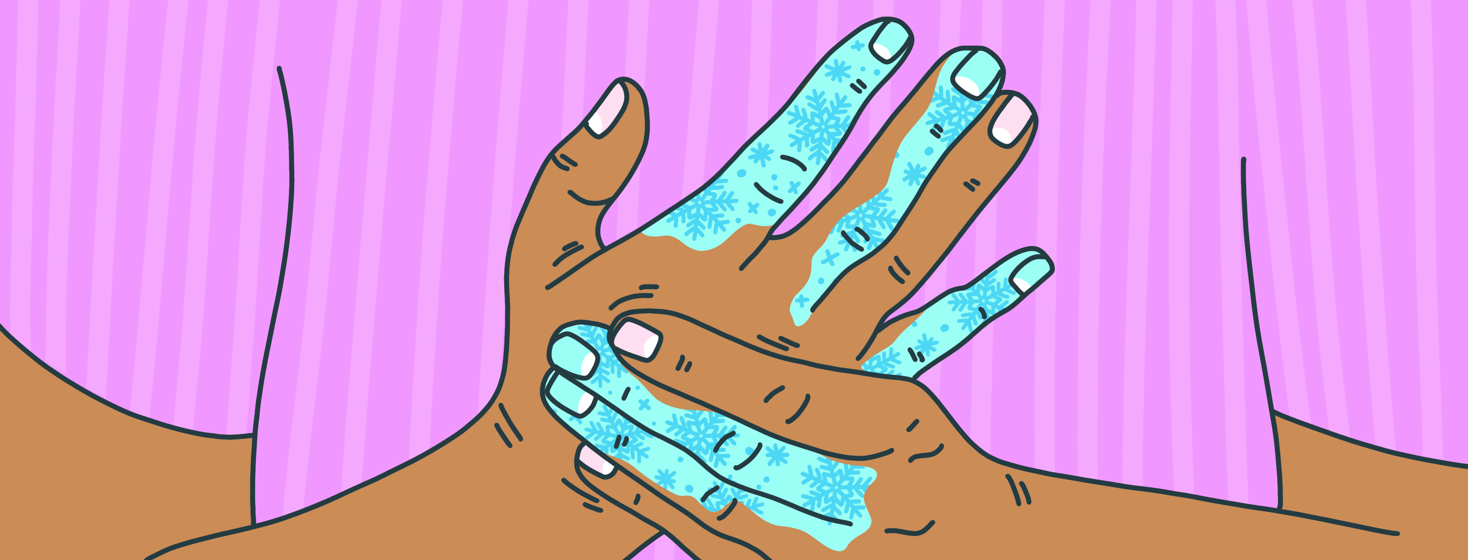Why Are My Fingertips White and Numb? Raynaud’s Disease and Eczema
Something strange has been occurring this year that I never really paid attention to.
Lately, if I’m out in the cold, for any given period of time, my fingertips and toes turn white and numb. And when I enter a warmer environment shortly after, it takes about 5 to 10 minutes for it to catch up with the rest of my body's temperature. Have you experienced this before?
What is Raynaud’s disease?
According to the National Heart, Lung, and Blood Institute (NIH), Raynaud’s is a rare disorder that affects and narrows one’s blood vessels causing brief episodes known as vasospasm. These episodes are what reduces the blood flow to the fingers and toes, causing the skin to turn white and then blue or red for a short period of time. (Rarely, the disorder affects other areas of the body including the nose, ears, nipples, and lips. Oy very!)1
Additionally, they tend to happen during winter months, but can also occur if you walk into a space with a blasting air conditioner or if you touch something super cold.
Types of Raynaud's disease
Raynaud’s Disease affects 5 to 10% of the US population and is found across all demographics.1
Primary Raynaud's disease
About 90% of these individuals have the primary type of Raynaud’s, which is considered to be a milder form and more of a nuisance. It’s not necessarily directly correlated to an underlying disease and doesn’t require medication to soothe the discomfort.1
Secondary Raynaud's disease
The remaining 10% have what’s called secondary Raynaud’s, which is normally associated with an underlying condition, such as an immune disease. (Where eczema comes into the picture). Research has stated that these individuals tend to be on medication and can experience long-term complications if not handled well.1
Can eczema cause symptoms of Raynaud's disease?
Although I have not been tested for Raynaud’s and don’t feel like the symptoms are bad enough to require medication, there is a good probability that eczema can be an underlying factor in what’s been occurring. This is where eczema comes into the picture as it could just be one of those “hidden” conditions that is causing the Raynaud's to take place below the surface of my skin.
Is Raynaud's harmful?
For the majority of people, Raynaud's isn’t harmful. It’s actually normal for the body to react to the cold and contract its vessels to keep the body and organs warm. But what happens with Raynaud’s disease is that this contraction is exaggerated.
What happens with Raynaud's disease?
Dr. Fredrick Wigley, a professor of medicine and director of the Johns Hopkins Scleroderma Center in Baltimore states, “In Raynaud's, this complex mechanism of reacting to the environment has gone astray and it's exaggerated. Instead of having a mild response to cold, patients with Raynaud's have a dramatic response."2
Question: Have you experienced these symptoms before? If so, check out some tips below.
Observe where your fingers or toes feel numb
Simply observe specific moments and places where your fingertips and/or toes become numb. What’s the environment like? Is it cold? Remember, Raynaud’s usually occurs AFTER you have been in the cold or have touched something cold.
Reflect on sensations and symptoms
Be sure to reflect on the sensations of your body when you experience Raynaud’s symptoms. Do these symptoms bother you? Are they a nuisance or are they really painful? Does it go away quickly or does it take some time?
Check with your doctor
If you feel compelled to, check-in with your doctor and let him or her know what’s been occurring. See if they recommend tips to best support you in managing your symptoms.

Join the conversation